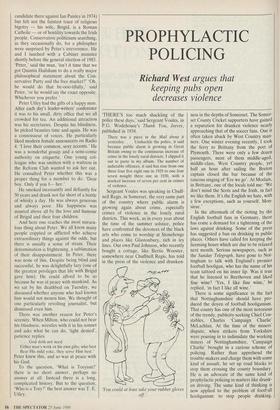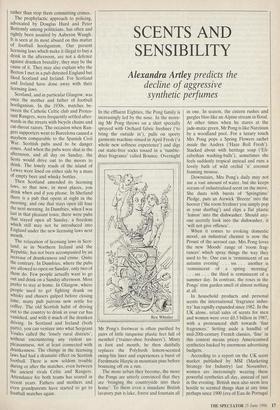PROPHYLACTIC POLICING
Richard West argues that
keeping pubs open decreases violence
`THERE'S too much shackling of the police these days,' said Sergeant Voules, in P.G. Wodehouse's Thank You, Jeeves, published in 1934.
There was a piece in the Mail about it yesterday. . . . Unshackle the police, it said because public alarm is growing in Great Britain owing to the continuous increase of crime in the lonely rural districts. I clipped it out to paste in my album. The number of indictable offences, it said has rose from one three four five eight one in 1929 to one four seven nought three one in 1930, with a marked increase of seven per cent in crimes of violence. . . .
Sergeant Voules was speaking in Chuff- nell Regis, in Somerset, the very same part of the country where public alarm is growing again about crime, especially crimes of violence in the lonely rural districts. This week, as in every year about the time of the summer solstice, police have confronted the devotees of the black arts who come to worship at Stonehenge and places like Glastonbury, rich in ley lines. Our own Paul Johnson, who recently bought a cottage, like Bertie Wooster, somewhere near Chuffnell Regis, has told in the press of the violence and drunken-
`You could at least take your rubber gloves off.' ness in the depths of Somerset. The Somer- set County Cricket supporters have gained a reputation for drunken violence nearly approaching that of the soccer fans. One is often taken aback by West Country man- ners. One winter evening recently, I took the ferry to Brittany from the port of Plymouth. There were only a few dozen passengers, most of them middle-aged, middle-class, West Country people, yet half an hour after sailing the Breton captain closed the bar because of the raucous singing of 'Ere we go'. At Morlaix, in Brittany, one of the locals told me: 'We don't mind the Scots and the Irish, in fact we like them. It's the English we hate, with a few exceptions, such as yourself, Mon- sieur.'
In the aftermath of the rioting by the. English football fans in Germany, there has come a demand for a tightening of the laws against drinking. Some of the press has suggested a ban on drinking in public places. Others have called for keeping the licensing hours which are due to be relaxed next month. Serious newspapers, such as the Sunday Telegraph, have gone to Not- tingham to talk with England's premier football hooligan, who has the name of his team tattoed on his inner lip. Was it true that he listened to Beethoven and liked fine wine? 'Yes, I like fine wine,' he replied, 'in fact I like all wine.'
There is some significance in the fact that Nottinghamshire should have pro- duced the doyen of football hooliganism. That county has one of the most notorious of the trendy, publicity-seeking Chief Con- stables, Charles 'Campaign Charlie' McLachlan. At the time of the miners' dispute, when strikers from Yorkshire were pouring in to indimidate the working miners of Nottinghamshire, 'Campaign Charlie' brought in a curious scheme of policing. Rather than apprehend the trouble-makers and charge them with some kind of assault, he set up road blocks to stop them crossing the county boundary. He is an advocate of the same kind of prophylactic policing in matters like drunk- en driving. The same kind of thinking is now applied to the problem of football hooliganism: to stop people drinking, rather than stop them committing crimes.
The prophylactic approach to policing, advocated by Douglas Hurd and Peter Bottomly among politicians, has often and rightly been assailed by Auberon Waugh. It is seen at its most absurd on this matter of football hooliganism. Our present licensing laws which make it illegal to buy a drink in the afternoon, are not a defence against drunken brutality; they may be the cause of it. They may also explain why the Breton I met in a pub detested England but liked Scotland and Ireland. For Scotland and Ireland have done away with their licensing laws.
Scotland, and in particular Glasgow, was once the mother and father of football hooliganism. In the 1930s, matches be- tween the Catholic Celtic club and Protes- tant Rangers, were frequently settled after- wards in the streets with bicycle chains and cut-throat razors. The occasion when Ran- gers supporters went to Barcelona caused a mayhem comparable to the Spanish Civil War. Scottish pubs used to be danger zones. And when the pubs were shut in the afternoon, and all day on Sunday, the Scots would drive out to the moors to drink. The lonely roads of the island of Lewes were lined on either side by a mass of empty beer and whisky bottles. Then Scotland amended its licensing laws, so that now, in most places, you drink when and if you please. In Shetland there is a pub that opens at eight in the morning, and one that stays open till four the next morning. In Dumfries, when I was last in that pleasant town, there were pubs that stayed open all Sunday, a freedom which still may not be introduced into England under the new licensing laws next month.
The relaxation of licensing laws in Scot- land, as in Northern Ireland and the Republic, has not been accompanied by an increase of drunkenness and crime. Quite the contrary. In Dumfries, where the pubs are allowed to open on Sunday, only two of them do. Few people actually want to go out and drink on a Sunday afternoon. Most prefer to stay at home. In Glasgow, where people used to get fighting drunk on whisky and chasers gulped before closing time, many pub patrons now settle for coffee. The old Scottish habit of driving out to the country to drink in your car has vanished, and with it much of the drunken driving. In Scotland and Ireland (both parts), you can venture into what Sergeant Voules called the 'lonely rural districts', without encountering any violent un- pleasantness, not at least connected with drunkenness. The change in the licensing laws had had a dramatic effect on Scottish football. There is now seldom trouble during or after the matches, even between the ancient rivals Celtic and Rangers. Attendance for both teams has soared in recent years. Fathers and mothers and even grandparents have started to go to football matches again.











































































 Previous page
Previous page